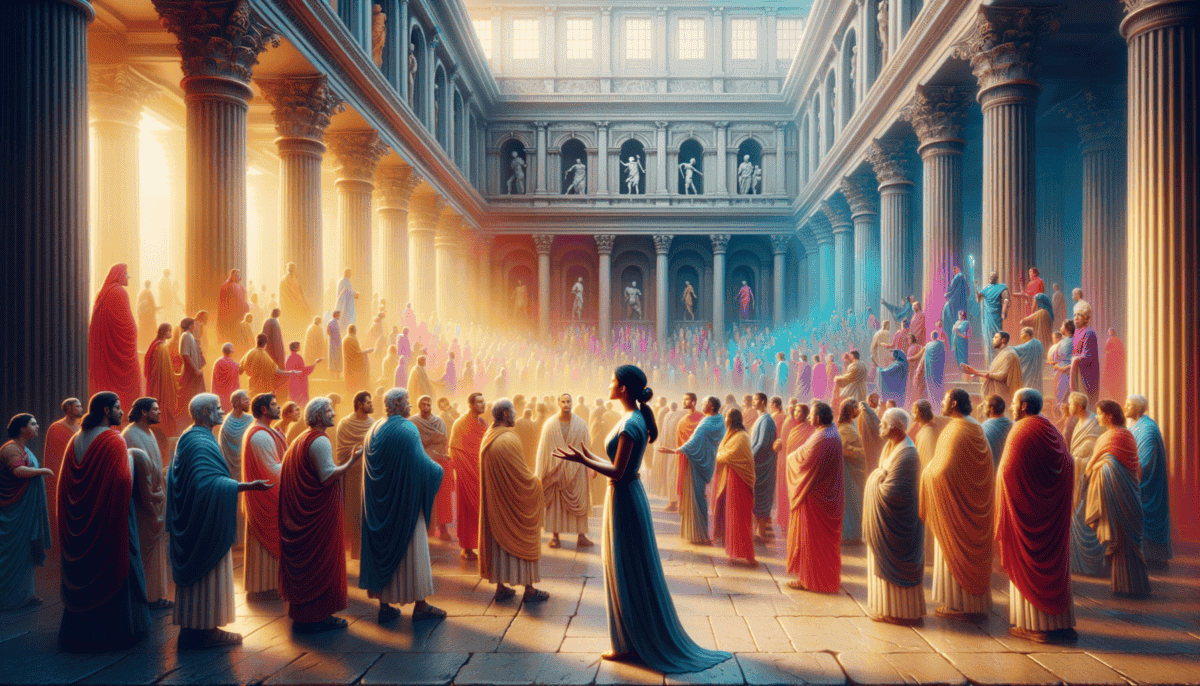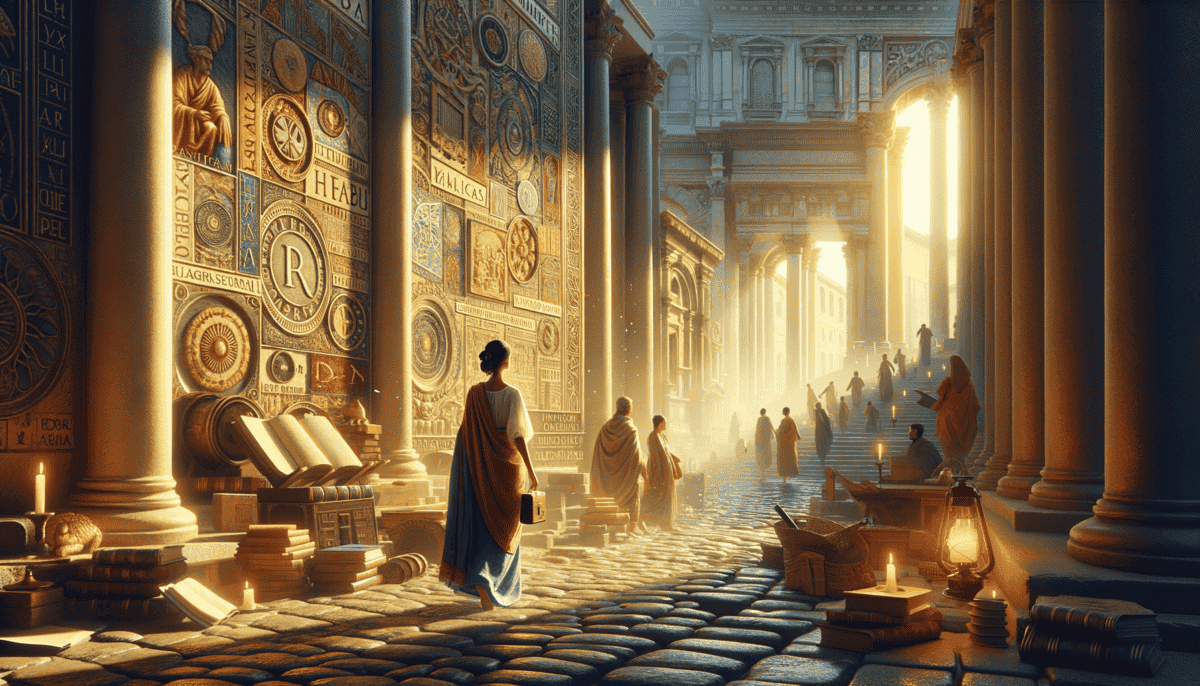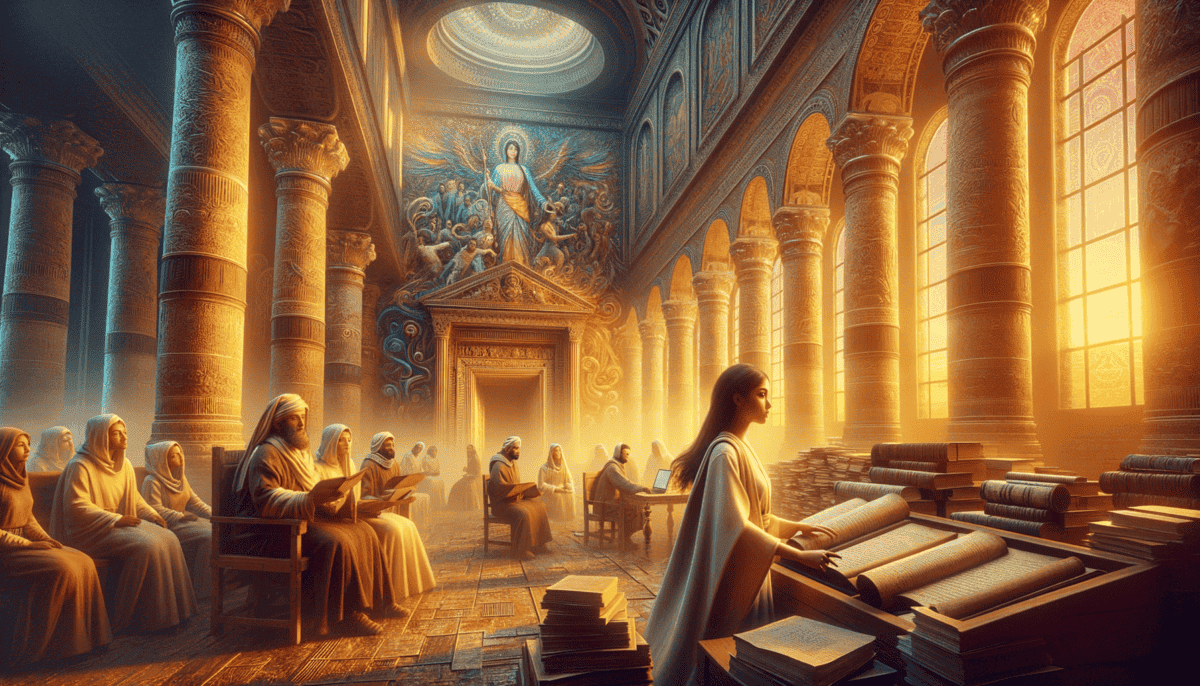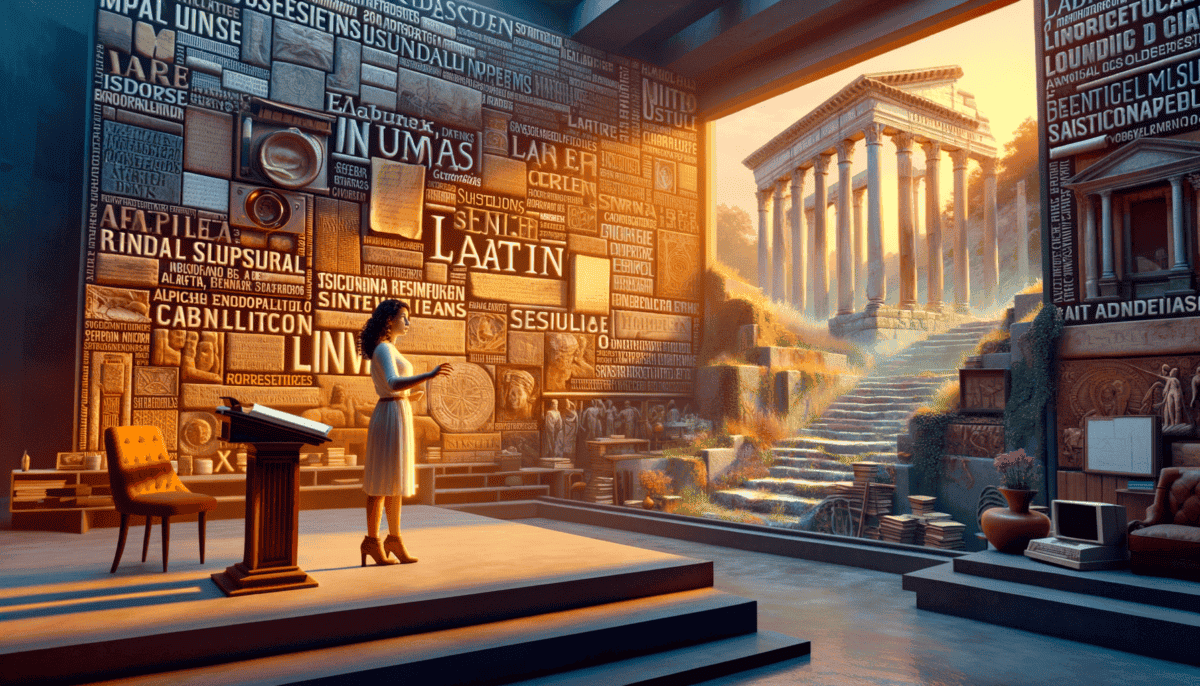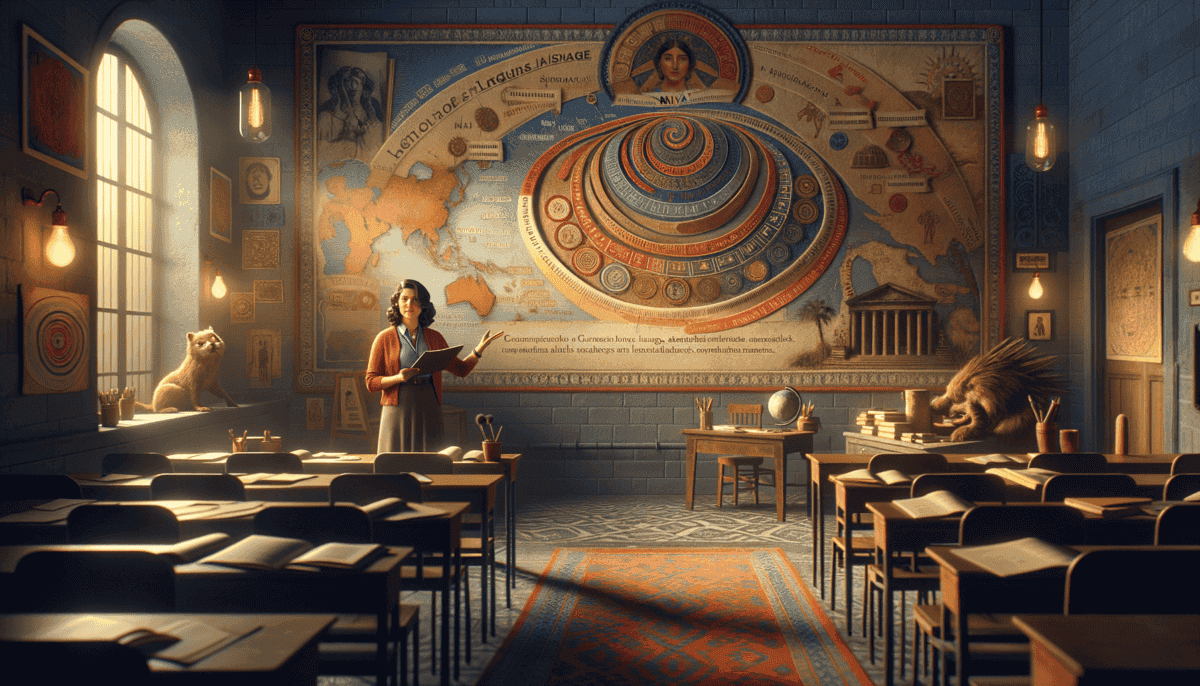The Time-Traveling Translator
Maya pressed her nose against the dusty glass case at the museum. Inside, strange letters and symbols danced across ancient pieces of pottery. She loved languages, especially old ones that told stories from long ago.
"What does it say?" she whispered, her breath fogging up the glass.
Her class had gone ahead, but Maya couldn't pull herself away from the mysterious writing. As she leaned closer, something sparkled in the corner of the display. It was small and golden, about the size of her palm.
"That's a special translator device," said a gentle voice behind her. Maya spun around to find an elderly museum guide with twinkling eyes. "Legend says it helped people understand Latin – the language of Ancient Rome."
Maya's eyes widened. "Really? How does it work?"
The guide smiled mysteriously and opened the case. "Why don't you find out?" She placed the golden device in Maya's hands.
It felt warm and tingly, like holding sunshine. Strange markings covered its surface, and in the center was a small red gem that pulsed like a heartbeat.
Colors swirled around her like paint in water. The museum walls melted away, and Maya felt herself floating through time and space. When everything stopped spinning, she found herself standing in a place that looked very different from the museum.
"Where am I?" she gasped.
The streets were made of stone, and tall buildings with columns stretched toward the sky. People walked past wearing long flowing robes, speaking in a language Maya had never heard before. But somehow, thanks to the golden translator in her hands, she could understand them!
• Salve = Hello
• Gratias = Thank you
• Vale = Goodbye
A young boy about her age stopped and smiled. "Salve!" he said cheerfully. "Welcome to Rome!"
Maya clutched the translator tighter. She was actually in Ancient Rome! The device hadn't just helped her understand Latin – it had taken her back in time!
"This is amazing," she breathed, watching as a group of students walked past, carrying scrolls and talking about their lessons. She could hear bits of their conversation:
"Did you finish copying the new verses?"
"I can't wait for poetry class!"
"My father says Latin is important for business."
Maya felt her heart racing with excitement. She was about to learn so much more than just words – she was going to discover how an ancient language lived and breathed in the streets of Rome itself.
The boy gestured for her to follow him. "Come on! The Forum is this way. That's where all the best speakers share their ideas. You won't believe what you're about to hear!"
Maya took a deep breath and stepped forward into her adventure. The translator device hummed warmly in her pocket, ready to help her unlock the secrets of Latin and discover how this ancient language still shapes our world today.
She had no idea that this was just the beginning of an incredible journey through time, words, and the power of human communication. But first, she needed to learn how to speak like a real Roman!
Voices from the Forum
Maya followed her new friend through the bustling streets of Ancient Rome. The golden translator hummed softly in her pocket as they approached a massive open space filled with people.
“This is the Forum,” the boy said proudly. “I’m Marcus, by the way. My father is a teacher here.”
Maya’s eyes grew wide as she took in the amazing sight. Tall marble columns reached toward the sky. People in flowing white togas rushed back and forth. The air buzzed with excited voices speaking Latin.
“Look!” Marcus pointed to a man standing on the steps of a beautiful building. “That’s Cicero. He’s the best speaker in all of Rome!”
A crowd gathered around as Cicero began to talk. Thanks to her magical translator, Maya could understand every word:
“Citizens of Rome! Today we gather to discuss the future of our great city…”
“His words are so powerful,” Maya whispered. “The way he uses Latin makes everyone want to listen!”
Suddenly, the crowd parted as another important-looking man walked by. He wore a bright red cape and had a crown of leaves on his head.
Maya watched as Caesar stopped to talk with some soldiers. Their Latin was different – shorter and stronger, with lots of military words. The translator helped her understand:
| Military Latin | English Meaning |
| Victoria | Victory |
| Legio | Legion |
As they walked through the Forum, Maya noticed how different people used Latin in different ways:
The merchants shouted about their goods in simple, fun Latin. The priests spoke in slow, serious tones. Children played games while singing Latin rhymes.
“Latin isn’t just one kind of language,” Maya realized. “It changes to fit what people need!”
Marcus nodded. “That’s why it’s so special. Latin helps everyone talk to each other, no matter who they are.”
As the sun began to set, the Forum filled with the sounds of evening prayers and friendly goodbyes. Maya watched as families headed home, their Latin words floating on the breeze.
She touched the translator in her pocket, grateful for its magic. In just one day, she had learned so much about how Latin lived in the hearts and voices of Ancient Rome.
“Tomorrow we can visit the marketplace,” Marcus said. “You’ll hear how Latin travels with traders from all over the empire!”
Maya smiled, excited to learn more. She was starting to understand that Latin wasn’t just a language of the past – it was alive with the stories and dreams of real people.
The Language of Empire
Maya’s next adventure took her far beyond the Forum, following Roman traders along dusty roads that stretched across the empire. Her magical translator glowed brighter with each new place they visited.
“Listen carefully,” Marcus said as they joined a group of merchants. “Every place we visit speaks Latin a little differently!”
Their first stop was in Gaul (now called France). Maya noticed something interesting about how the people talked:
“Bonjour!” a little girl called out, mixing her local words with Latin. “Mater says it’s time for breakfast!”
“Did you hear that?” Maya asked excitedly. “She used both Latin and her own language!”
As they traveled, Maya kept a special list of words that changed in different places:
| Latin Word | How It Changed |
| Aqua (water) | Agua (Spanish) |
| Panis (bread) | Pain (French) |
In Britain, Maya met a Roman soldier teaching Latin to local children:
“Repeat after me,” he said kindly. “Pater, Mater, Frater…”
In Egypt, they visited a busy port where ships brought goods from far away. Merchants from many lands used Latin to trade:
“Pretium bonum!” (Good price!) called a spice seller.
“Optimum!” (The best!) answered a buyer.
Maya watched as a young Egyptian scribe carefully copied Latin words onto papyrus. “We keep records in both Latin and Egyptian,” he explained. “That way, everyone can understand.”
As they traveled back to Rome, Maya noticed how Latin changed like a river flowing through different lands. It picked up new words and ways of speaking, but kept its strong Roman heart.
“The empire is big,” Marcus said, “but Latin makes it feel like one big family.”
That night, Maya dreamed of Latin words dancing across maps, connecting people from far-away places. She understood now that when languages meet and mix, wonderful new things can happen.
Tomorrow, she would discover how Latin became the special language of scholars and wise people. But for now, she was happy knowing that Latin helped build bridges between different cultures, creating new ways for people to share their stories.
Secrets of the Scholars
Maya’s magical translator pulsed with a gentle blue light as she stepped into the grand Library of Alexandria. The smell of papyrus scrolls filled the air, and sunlight streamed through tall windows.
“Welcome to where knowledge lives,” whispered her guide Claudia, a young Roman scholar. “Here, Latin helps us learn about everything!”
Maya watched in amazement as scholars from different lands worked together:
“Look at these star maps,” said a Greek astronomer. “In Latin, we call the bright star ‘Stella Polaris.'”
“That’s the North Star!” Maya exclaimed. “We still use that Latin name today!”
In another room, doctors studied medicine:
| Body Part | Latin Name |
| Heart | Cor |
| Brain | Cerebrum |
“Even today,” Claudia explained, “doctors use Latin words to talk about the human body.”
They visited a room where poets wrote beautiful stories:
“Poetry helps us remember important things,” said a young poet. “Listen to this verse about the seasons!”
Maya noticed how the Latin words seemed to dance and sing. Some poems even told stories about brave heroes and magical creatures.
In the garden, students practiced speaking and writing:
“Salvete, discipuli!” (Hello, students!) called their teacher.
“Salve, magister!” (Hello, teacher!) they answered together.
Maya joined a group of young scholars learning about plants. They used Latin names that told them what each plant could do:
“Lavandula helps you sleep,” explained a student. “And Rosmarinus helps you remember!”
“Those are lavender and rosemary!” Maya realized. “We still use those Latin names!”
As the sun began to set, Maya helped copy a scroll about numbers and shapes. The Latin words were clear and exact, perfect for explaining big ideas.
“Knowledge in Latin travels everywhere,” Claudia said. “It’s like a key that opens doors to learning.”
That night, Maya dreamed of Latin words flying like birds, carrying wisdom across time. Tomorrow would bring new discoveries about how Latin lives in our words today, but for now, she understood why scholars loved this special language so much.
Latin’s Hidden Legacy
Maya blinked as her magical translator brought her back to her school library. Her head buzzed with all the Latin words she had learned from her amazing journey.
She pulled out her notebook and started writing down all the Latin words she could spot around her:
| English Word | Latin Origin |
| Exit | Exitus (way out) |
| Library | Librarium (book place) |
Her friend Tom walked over. “What are you writing?” he asked.
“Did you know that when we say ‘video,’ we’re using an old Latin word that means ‘I see’?” Maya explained excitedly.
She remembered what she learned about science words:
- Aqua = water
- Terra = earth
- Luna = moon
- Sol = sun
- Animal = living thing
“Even when we talk about computers,” Maya told Tom, “we use Latin! ‘Computer’ comes from ‘computare’ – to count!”
During lunch, Maya noticed more Latin connections:
“Menu” comes from “minutus” – something small
“Pasta” comes from “pasta” – dough
“Cafeteria” comes from “cafaeus” – coffee
In her Spanish class later that day, Maya got another surprise. Many Spanish words came straight from Latin:
After school, Maya went to the doctor for a checkup. She smiled when she saw all the Latin medical words:
“Doctor” means “teacher” in Latin!
“Patient” comes from “patiens” – someone who waits
“Medicine” comes from “medicina” – healing
That evening, Maya watched the news with her parents. Even there, Latin words popped up:
“Media” – middle things
“Video” – I see
“Radio” – I beam
“Latin isn’t dead at all,” Maya thought. “It’s just hiding in plain sight!”
Before bed, Maya wrote in her diary about her discovery: Latin was like a big family tree of words, with branches reaching into many modern languages. Every new word she learned seemed to have a Latin story behind it.
The Eternal Conversation
Maya sat in her favorite corner of the school library, her magical translator glowing softly beside her. She couldn’t wait to share her amazing discoveries!
She decided to start a “Language Explorer Club” at school. Her first meeting was at lunch time, and lots of kids came!
“Did you know that when you say ‘I love you, Mom,’ you’re using words that came from ancient Rome?” Maya told her friends.
Maya drew a big tree on the board and labeled it “The Language Family Tree.” She showed how Latin grew into new languages:
| Latin Word | New Languages |
| Mater (mother) | madre (Spanish), mère (French) |
| Nox (night) | noche (Spanish), nuit (French) |
Her teacher, Ms. Rodriguez, was so impressed that she asked Maya to give a special talk to the whole school!
• Words are like time machines that connect us to the past
• Languages grow and change like living things
• Every word has a story to tell
• We’re all part of one big language family
• Learning languages helps us understand each other better
After her talk, something magical happened. Kids from different grades started their own word-hunting adventures! They made a giant wall display called “Word Detective Wall” where everyone could post cool word discoveries.
One day, Maya’s little brother asked her, “Will Latin ever really die?”
Maya smiled and said, “Languages never really die. They just change into new forms, like butterflies coming out of cocoons!”
She thought about all she had learned on her amazing journey:
✨ The Empire showed her how languages spread
✨ The scholars proved that knowledge lives through words
✨ Modern times revealed Latin hiding everywhere
Maya kept her magical translator as a special reminder. But now she knew the real magic wasn’t in the device – it was in the words themselves, in the stories they told, and in the way they connected people across time.
Maya’s next adventure? Learning Greek! After all, she thought with a grin, every language has new secrets to share, new stories to tell, and new friends to make.


